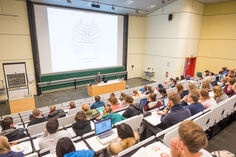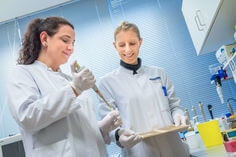Preparation
Finding an appropriate topic
Most doctoral theses are awarded via unsolicited applications. Another part of the doctoral theses is advertised, for example, via the MEDISS Promotionsbörse. Whether you are applying for an advertised job or sending an unsolicited application, you should put your request in writing (usually by e-mail). During the interview or a further discussion, you should discuss the topic of the dissertation, conditions and expectations as detailed as possible and document them in writing.
Define the subject area and type of work
Narrow down the subject area/topic focus and character of the thesis. Include in your considerations also the recommendations for the assessment of dissertations.
Character of the work
Basically, there are experimental, clinical (prospective vs. retrospective / "statistical") and theoretical doctoral theses. At this point, we would like to briefly explain the three terms.
Note: The character of the thesis is taken into account when assigning grades.
Experimental doctoral theses
- Usually work in preclinical or basic clinical research.
- Objects of investigation: Cell cultures, organ material, animal models
- 1-3 years of work in the laboratory
- With good topic and processing: first access to research / university career
To note: In some cases, an "experimental animal course" (short: "animal course") is required at the IBF. The lead time for a participation position is approximately 6 months. If patient material is used, an ethics vote may also be required.
Prospective clinical studies
- E.g. cohort and intervention studies
- Data is collected only after the start of the study
- Usually a comparison or placebo group and a therapy group
- Data collection takes about 1-2 years
To be noted: Clarify in advance in which time frame the patient sample is to be collected or whether an application has to be submitted to the ethics committee, etc.
Retrospective / "statistical" studies
- E.g. case-control study, meta-analysis
- Data already available
- Mostly archive work
- Only generation of hypotheses
Please note: Clarify data quality, as it can vary widely. Even retrospective studies usually require an application to the ethics committee.
Theoretical doctoral theses
- Theses in the fields of: History, theory or ethics of medicine, medical education, medical informatics or biometrics.
- Duration approx. 2-3 years
Promotionsbörse
Search for offers in the MEDISS Promotionsbörse. In addition, you will find information from the clinics and institutes on doctoral theses and unsolicited applications in the exchange.
Further information sources & advice
Find out more about:
- Website of the Office of doctoral affairs and the MEDISS program.
- Information from the student council
- Friends, acquaintances
- Introductory events for the doctorate in medicine (dent.)
- Partnerships
Organizational aspects
Interview
Prepare for the interview: Review lecture and internship content of the subject area, research the department website and literature databases, make an appointment, make a list of points you want to address.
Foreign degrees
If you have completed your studies abroad, please note that foreign educational qualifications must first be checked for equivalence with a German university degree before you can be accepted as a doctoral candidate. Since this may take several weeks at the Central Office for Foreign Education (anabin) in Bonn, depending on the country, the relevant documents should be submitted as early as possible in officially certified copies.
Selection of the supervisor
Be clear about the type of supervisor you want: Should the supervisor be more person- or subject-oriented, should he or she provide close supervision or give you room for your own ideas and mistakes? Are joint, structured seminars with other doctoral students important to you or do you prefer individual supervision?
On the basis of a few points, you can already assess in advance how a possible future supervision relationship can be structured. Depending on the priority, you can consider the following:
Publication
Publications of the doctoral supervisor can give information about:
- Current research topic
- Publication record of the laboratory
- Networking / cooperation partners
Publications can be found in the database PubMed.
In heiDOK the topics of former dissertations of the working group are listed.
Preliminary discussions with your supervisor
In the preliminary discussions with your supervisor, you should also address these questions:
- Who is supervising me?
- Are there other doctoral students?
- How will I be trained?
- Is a trial internship / probationary period planned?
- Is long-term supervision guaranteed?
Consultations with members of the working group
If possible, you should also try to talk to other members of the working group to get an impression of the working atmosphere. In SFBs, good supervision is usually guaranteed.



![[Translate to English:] [Translate to English:]](/fileadmin/_processed_/9/b/csm_Firefly_Abstract_organic_flow_resembling_blood_vessels_shaped_as_a_tool__composed_of_glowing_651800_26778ea790.png)
